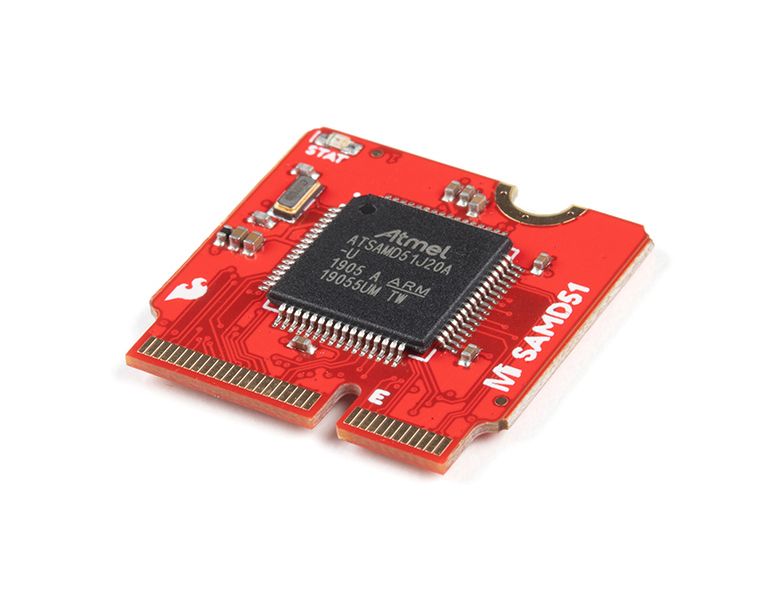MicroMod SAMD51 Processor
by SparkFun

With a 32-bit ARM Cortex-M4F MCU, the SparkFun MicroMod SAMD51 Processor Board is one powerful microcontroller packaged on a small board! The board provides you with an economical and easy to use development platform if you’re needing more power with minimal working space. With the M.2 MicroMod connector, connecting your SAMD51 Processor is a breeze. Simply match up the key on your processor’s beveled edge connector to the key on the M.2 connector and secure it with a screw (included with all Carrier Boards). The SAMD51 is one of the most powerful and economical microcontrollers available so to be able to add it to your MicroMod Carrier Board is a huge advantage for your project!
The ATSAMD51J20 utilizes a 32-bit ARM Cortex-M4 processor with Floating Point Unit (FPU), running up to 120MHz, up to 1MB of flash memory, up to 256KB of SRAM with ECC, up to 6 SERCOM interfaces, and other features. This MicroMod SAMD51 even comes flashed with the same convenient UF2 bootloader like the SAMD51 Thing Plus and the RedBoard Turbo.
Purchase
Contribute
Have some info to add for this board? Edit the source for this page here.
CircuitPython 9.2.1
This is the latest stable release of CircuitPython that will work with the MicroMod SAMD51 Processor.
Use this release if you are new to CircuitPython.
Built-in modules available: _asyncio, _bleio, _pixelmap, adafruit_bus_device, adafruit_pixelbuf, aesio, alarm, analogio, array, atexit, audiobusio, audiocore, audioio, audiomixer, audiomp3, binascii, bitbangio, bitmaptools, board, builtins, builtins.pow3, busdisplay, busio, busio.SPI, busio.UART, codeop, collections, countio, digitalio, displayio, epaperdisplay, errno, floppyio, fontio, fourwire, framebufferio, frequencyio, getpass, gifio, i2cdisplaybus, i2ctarget, io, jpegio, json, keypad, keypad.KeyMatrix, keypad.Keys, keypad.ShiftRegisterKeys, locale, math, max3421e, microcontroller, msgpack, neopixel_write, nvm, onewireio, os, os.getenv, paralleldisplaybus, ps2io, pulseio, pwmio, rainbowio, random, re, rgbmatrix, rotaryio, rtc, samd, sdcardio, select, sharpdisplay, storage, struct, supervisor, synthio, sys, terminalio, time, touchio, traceback, ulab, usb, usb_cdc, usb_hid, usb_midi, vectorio, warnings, watchdog, zlib
Features: Bluetooth/BTLE
Absolute Newest
Every time we commit new code to CircuitPython we automatically build binaries for each board and language. The binaries are stored on Amazon S3, organized by board, and then by language. These releases are even newer than the development release listed above. Try them if you want the absolute latest and are feeling daring or want to see if a problem has been fixed.
Previous Versions of CircuitPython
All previous releases of CircuitPython are available for download from Amazon S3 through the button below. For very old releases, look in the OLD/ folder for each board. Release notes for each release are available at GitHub button below.
Older releases are useful for testing if you something appears to be broken in a newer release but used to work, or if you have older code that depends on features only available in an older release. Otherwise we recommend using the latest stable release.
